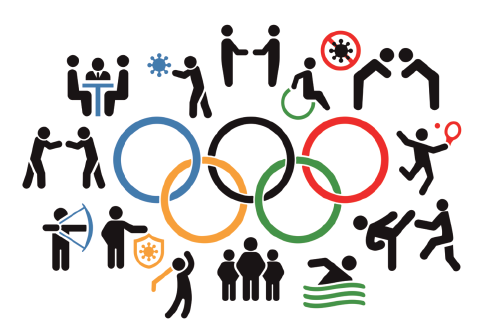Can Olympics thaw China-Japan ties?


Editor's Note: The Tokyo Olympic Games officially started on July 23 amid the COVID-19 pandemic, yet many see it as a ray of hope in a world battling serious challenges, especially because it represents the spirit of human beings. Three experts share their views on the issue with China Daily:
After a yearlong delay, the opening ceremony on July 23 finally kicked off the Tokyo 2020 Olympic Games amid the still-raging COVID-19 pandemic. The Tokyo Olympics has attracted added attention worldwide, because it is the first major global sports event to be held after the pandemic broke out last year, and Japan has encountered four waves of novel coronavirus infections and the response of local health authorities has not been consistent.
The Japanese government announced a fourth state of emergency for Tokyo from July 12 to Aug 22 following the latest surge in infections. But that has not checked the spread of the virus in Tokyo.
Yet the Tokyo Olympics has won the support from all corners of the globe. For example, United Nations Secretary-General Antonio Guterres said on July 21 that "the Olympic spirit brings out humanity's best", and "inspires and unifies us in troubled times", while stressing that "every athlete in Tokyo has overcome enormous obstacles".
The Tokyo Games is not only about Japan. It is also much more than a mega sports event, as it reflects human being's determination and ability to overcome all odds, even defeat the virus. China, which will host the 2022 Winter Olympics, has always supported Japan hosting the Tokyo Games. During his talks with International Olympic Committee President Thomas Bach on the phone in January and May, President Xi Jinping said China will work with the IOC and its member countries to support Tokyo Summer Olympics and ensure a safe and smooth Beijing Winter Olympics.
China's Foreign Ministry, too, said ahead of the Tokyo Games that the Chinese and Japanese leaders support each other in holding successful Summer and Winter Olympics. China has also been in close communication with the Tokyo Organizing Committee of the Olympic and Paralympic Games and Japanese government departments, and promised all help to ensure the success of the Tokyo Games.
Accordingly, China has sent a 777-member team to Tokyo, its largest sports delegation to any Olympic Games held overseas. It has also sent about 900 journalists to Japan to cover the Olympics, and will dispatch a 480-member delegation for the Paralympics.
The Beijing Winter Games, to be held from Feb 4 to 20, has the added responsibility of inspiring and unifying people around the world in the fight against the pandemic. In this regard, China and Japan have a lot to learn from each other.
That's why a 34-member observer team of the Beijing Winter Games is part of the Chinese delegation to Tokyo. The team members will study the functioning of the Tokyo Olympics organizing committee, and attend seminars to learn from the experience of their Japanese counterparts.
Hopefully, the direct talks between the Chinese and Japanese officials in Tokyo will help improve Sino-Japanese relations.
In 2019, the two countries agreed to build bilateral ties in accordance with the needs of the new era, with many experts saying the Tokyo Olympics would further boost Sino-Japanese ties. But bilateral ties have been fluctuating since last year since the outbreak of the pandemic.
In the initial stage of the pandemic, the two sides helped each other, but later Japan joined the United States to pressure Beijing on issues involving the Diaoyu Islands, Xinjiang and Hong Kong, which soured bilateral ties. And in its 2020 Diplomatic Bluebook, Japan supported Taiwan's bid to take part as an observer in the World Health Assembly, the decision-making body of the World Health Organization. Besides, in its 2021 Defense White paper, Japan for the first time stressed the importance of stability around Taiwan, which is a direct interference in the country's internal affairs.
Against this backdrop, the Olympics has given the two sides an opportunity to improve bilateral relations through cooperation.
During her meeting with Kong Xuanyou, Chinese ambassador to Japan in July, Seiko Hashimoto, president of the Tokyo Olympics organizing committee, thanked China for sending its largest team to the Olympics and hoped the Chinese athletes would perform well, while emphasizing that Japan attaches great importance to Olympics cooperation with China.
It is therefore hoped that the Olympics will increase people-to-people exchanges between China and Japan, add new vigor to bilateral ties and contribute to the development of the Olympics.
Sino-Japanese relations have undergone many twists and turns in their more than 2,000-year history. Their relationship can be defined as complementary in trade and economy, social governance, and low-carbon development. As such, the two sides can benefit from deeper cooperation.
According to the Japanese Finance Ministry, Japan's total exports in 2020 declined 11.1 percent year-on-year, the worst in 11 years, due to the pandemic. Yet Japan's exports to China, its largest trading partner, increased 2.7 percent, and accounted for 22 percent of Japan's total exports.
Indeed, as President Xi Jinping told Prime Minister Yoshihide Suga during their talks on the phone in September last year, China and Japan have many common interests and wide room for cooperation. So the two countries should deepen cooperation while making efforts to resolve their differences.
China will continue to communicate and cooperate with Japan so long as Japan respects China's sovereignty and territorial integrity.
We hope the Tokyo Summer Olympics and Beijing Winter Olympics are successful, and inject new vigor into the international community, as well as boost the confidence and determination of the world to overcome even the most difficult challenges.
The views don't necessarily reflect those of China Daily.
The author is director-general of the Institute of Japanese Studies, Chinese Academy of Social Sciences.

































